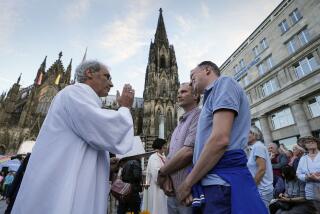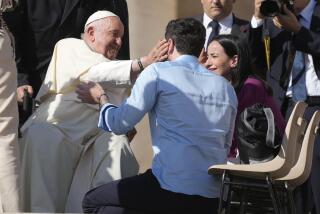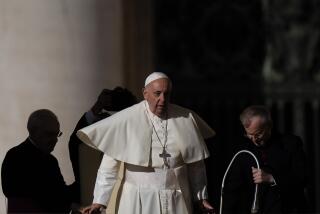Ecumenists Hail Interfaith Baptismal Certificates
- Share via
Some churches baptize only adults, others baptize infants, but church leaders in Connecticut believe their denominations have enough in common to formally recognize all baptisms as legitimate.
To demonstrate that, the Christian Conference of Connecticut--which includes Protestant, Orthodox and Catholic representation--has developed an interdenominational baptismal certificate that is being hailed as a major step in ecumenical cooperation and a down-to-earth sign of unity among Christians.
The certificate, believed to be the first of its kind in the nation, breaks no new theological ground and does not carry the weight of church law. It simply says that a person was “baptized with water in the name of the Father and of the Son and of the Holy Spirit,” an ancient formulation that most mainstream churches accept as reflecting the basic elements of the baptismal rite.
Ecumenical experts in several denominations involved said that the certificate does not violate general policies or theology of the churches and that they anticipate no problems in using the document. A Greek Orthodox spokesman, however, said the document should be reviewed by the national church hierarchy before it is used by any local Orthodox congregations.
Several well-known religious figures in the state, including Bishop Arthur Walmsley of the Episcopal Diocese of Connecticut and Bishop Daniel Reilly of the Catholic Diocese of Norwich, have already said they will recommend use of the certificate.
The Rev. G. Donald Ferree, an Episcopal priest who led the task force that developed the certificate, said it is important because it “compels people to do something” and is also a “very visible way of recognizing” what the churches have in common.
That view was echoed by Brother Jeffrey Gros, associate director of ecumenical and interreligious affairs at the National Conference of Catholic Bishops in Washington, who said Tuesday that the certificate “has a potential significance that’s above and beyond the paper it’s written on.”
Gros said the common baptismal document would serve as “a very, very tangible witness” of common understandings of Christianity that seldom make their way beyond the highly technical ecumenical dialogues carried on by theologians and church bureaucrats in larger forums.
Use of the certificate in Catholic parishes should not create any theological problems, Gros said, because the church has accepted the Trinitarian baptism formulation on the certificate as legitimate--regardless of what denomination the baptism was performed in.
Experts in several other denominations echoed Gros’ comments, but the Rev. Milton Efthimiou, the ecumenical officer at Greek Orthodox headquarters in New York, said the certificate should not be used until it is approved by the church hierarchy.
The Rev. Stephen Sidorak Jr., a United Methodist clergyman who is executive director of the conference, said the certificate has received an “incredible reception” among the member churches of the Christian Conference, which includes all of the major mainline churches in the American ecumenical movement.
According to Sidorak, the conference hopes ecumenical bodies in other parts of the country will follow suit and develop shared baptismal documents of their own.
Gros, who until last year served as the National Council of Churches’s chief staff officer on interchurch theological matters, predicted that the shared baptismal certificate will be warmly received by all churches historically linked to the ecumenical movement but probably not by the more conservative churches, such as the Southern Baptist Convention, which staunchly opposes infant baptism.
More to Read
Sign up for Essential California
The most important California stories and recommendations in your inbox every morning.
You may occasionally receive promotional content from the Los Angeles Times.













